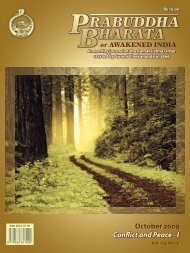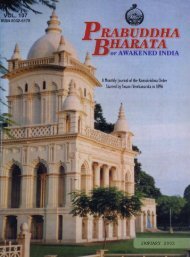October 2011 - Advaita Ashrama
October 2011 - Advaita Ashrama
October 2011 - Advaita Ashrama
You also want an ePaper? Increase the reach of your titles
YUMPU automatically turns print PDFs into web optimized ePapers that Google loves.
44<br />
648<br />
wicked, my God the miserable, my God the<br />
poor of all races, of all species, is the special object<br />
of my worship (5.136–7).<br />
Swami Vivekananda brought the highest<br />
teachings of the Vedas to India’s masses and to<br />
the world. Throughout India his call resounded:<br />
‘Arise! Awake! And stop not till the goal is<br />
reached.’ In 1897 he delivered in Madras his<br />
powerful lecture ‘The Future of India’. Regarding<br />
that great event Romain Rolland wrote years<br />
later: ‘From that day, the awakening of the torpid<br />
Colossus began. If the generation that followed,<br />
saw, three years after Vivekananda’s death, the<br />
revolt of Bengal, the prelude to the great movement<br />
of Tilak and Gandhi … it is due to the initial<br />
shock, to the mighty “Lazarus, come forth!”<br />
of the message from Madras.’ 25<br />
He had great hope for the future generations<br />
of India. Her true servants and teachers would<br />
emerge from their poverty and rural isolation<br />
to build her anew. Sometime in 1900 Swamiji<br />
writes in his ‘Memoirs of European Travel ’:<br />
Let her [India] arise—out of the peasant’s cottage,<br />
grasping the plough; out of the huts of the<br />
fisherman, the cobbler, and the sweeper. Let her<br />
spring from the grocer’s shop, from beside the<br />
oven of the fritter-seller. Let her emanate from<br />
the factory, from marts, and from markets. Let<br />
her emerge from groves and forests, from hills<br />
and mountains. These common people have<br />
suffered oppression for thousands of years—<br />
suffered it without murmur, and as a result have<br />
got a wonderful fortitude. They have suffered<br />
eternal misery, which has given them unflinching<br />
vitality. Living on a handful of grain, they<br />
can convulse the world; give them only half a<br />
piece of bread, and the whole world will not<br />
be big enough to contain their energy; they are<br />
endowed with … inexhaustible vitality. … And,<br />
besides, they have got the wonderful strength<br />
that comes of a pure and moral life, which is not<br />
Prabuddha Bharata<br />
to be found anywhere else in the world. Such<br />
peacefulness and contentment, such love, such<br />
power of silent and incessant work, and such<br />
manifestation of lion’s strength in times of action—where<br />
else will you find these! 26<br />
By 1902, the year of Swamiji’s mahasamadhi,<br />
the world began to witness the awakening of<br />
India in response to his call.<br />
Great and far-reaching was the effect of<br />
Swamiji’s feeling for the poor and afflicted. In<br />
April 1898 he was in Darjeeling. Returning there<br />
after visiting the snowy region of Sandukphu<br />
he suffered an attack of fever accompanied by<br />
coughing and a bad cold. He was well on the way<br />
to recovery when he received news of the plague<br />
in Calcutta. The shock put him in a grave mood<br />
and his health declined. Akhandananda remembered<br />
the incident:<br />
Swamiji had been such a jolly person. Suddenly<br />
one morning I found that he had become serious.<br />
The whole day he did not eat anything,<br />
nor did he talk with anybody. The doctor was<br />
immediately called, but could not diagnose the<br />
disease. He [the Swami] sat the whole day with<br />
his head on a pillow. Then I heard that in Calcutta<br />
three-fourths of the population had left<br />
the metropolis owing to the plague epidemic.<br />
That’s why Swamiji had become so serious. The<br />
Swami said at that time, ‘We have to serve them,<br />
even though we are required to sell everything.<br />
We were only wandering monks living under a<br />
tree. We shall stay under a tree.’ 27<br />
In April and May 1898 the Ramakrishna Mission<br />
rallied their resources to alleviate the terrible<br />
effects of that year’s plague in Calcutta.<br />
Despite being ill, on 3 May 1898 Swamiji returned<br />
to Calcutta with a full heart to head the<br />
massive relief work. The monks were daunted by<br />
the lack of funds, which had already been used<br />
to purchase land for building the new Math<br />
at Belur, the treasured future home of their<br />
PB <strong>October</strong> <strong>2011</strong>

















